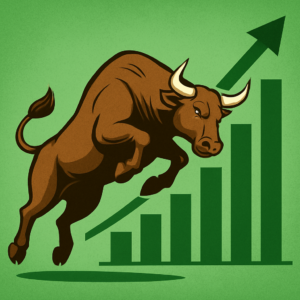Rising interest rates are no boon to lenders and borrowers, but they can have the opposite effect on traders. As interest rates rise, the wider public would expect stock prices to fall. This is because higher borrowing costs act as a headwind to the stock market.
In reality, that is not strictly the case, and for some industries rising interest rates actually benefit business performance and contribute to an overall positive outlook for stocks.
For the purposes of this blog, we’re talking about modest rise in interest rate, not a parabolic leap into double figures.
Let’s take a look at the industries that stand to benefit from a modest rise in interest rates.
Financials
Financials have historically been among the most sensitive to changes in interest rates. That makes sense considering that many of the stocks within the sector are key players in the banking industry.
Banks, insurance companies, brokerages and money managers all benefit from higher rates where they can make better margins.
Rising interest rates can also indicate a strong economy where borrowers are having an easier time making loan payments and banks have fewer non-performing assets.
Brokerages hold promise for similar reasons. A healthy economy sees more investment activity and they benefit from increased interest income when rates move higher.
Insurance stocks also flourish as rates rise. The relationship between interest rates and insurance companies is linear: The higher the rate, the greater the growth. Insurers must hold lots of safe debt to back the insurance policies they write. That means their underlying bond investments will yield weak returns in low-rate climates. Hence, they generally do not fare well in low-rate climates.
Consumer Discretionary
A rising interest rate environment can be a boon for consumer discretionary stocks. Also known as discretionary spending, consumer discretionary is the part of consumer spending that is not essential. Most consumer discretionary stocks are tied to the housing and auto markets and include companies in categories such as furniture, appliances, restaurants and apparel.
These stocks can see a bump because improving employment. Coupled with a healthier housing market, makes consumers more likely to splurge on purchases outside of the realm of consumer staples (food, beverages, and hygiene goods).
Higher rates can also boost the outlook for some sectors that are subject to cyclicality. When rates rise, it is often a sign of economic growth, which spurs consumers to spend more.
Wholesalers and Retailers
When the Federal Reserve raises its interest rate, it is good news for wholesalers and retailers. With the increase in interest rates comes an increase in the health of the economy as well. That means more disposable income.
This is good news for all businesses, especially those selling luxury items or services such as movie theatres, restaurants, hotels and clothing stores. Manufacturers and sellers of kitchen appliances, cars, clothes, hotels, restaurants, and movies also benefit from the economic health dividend.
Consumers tend to spend more as their confidence in the economy grows. When they are confident that they will have a job tomorrow or next week or next year, they will spend more money today because they feel secure about their future income.
Industrials
The industrial sector is among the most economically sensitive sectors of the stock market.
The reason why industrials tend to do well after rate hikes is simple. They benefit from a growing economy. This is because it drives higher demand for everything from construction equipment to raw materials.
Businesses are also more confident about spending on capital goods — items such as computers, heavy machinery and equipment used by factories and other businesses.
The Bottom Line …
Interest rate announcements is one of the key news to watch as a trader as it can have a dramatic impact on stock prices.
Rising rates are typically associated with improving economic conditions. Hence, they are a strong indicator for stocks on the whole once some sort of equilibrium is achieved between rising rates and inflation.
With that in mind, we’re keeping an eye out on stocks and sectors that are exhibiting signs of bullish big money activity following the FED’s decision to raise interest rates.



